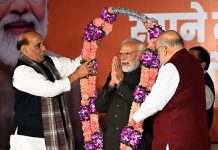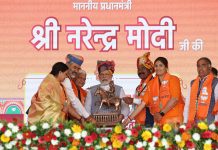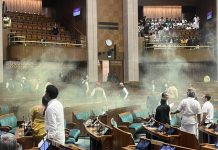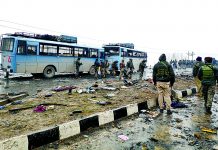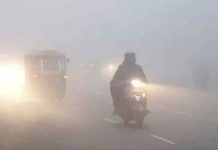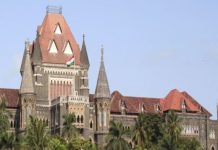 On April 9, the mainstream parties in J&K went into a huddle to deliberate about the worsening situation in the state. At the end of it, the Chief Minister, Mehbooba Mufti, called on them to announce a unilateral ceasefire in the state for a peaceful upcoming month of Ramadhan and two-month-long Amarnath Yatra. The participants in the meeting, also, suggested a meeting of all-party delegation with the Prime Minister, Narendra Modi, to urge him to review his government’s iron-fist policy on the state and announce a political initiative geared to resolve the deeply troubled situation in the state.
On April 9, the mainstream parties in J&K went into a huddle to deliberate about the worsening situation in the state. At the end of it, the Chief Minister, Mehbooba Mufti, called on them to announce a unilateral ceasefire in the state for a peaceful upcoming month of Ramadhan and two-month-long Amarnath Yatra. The participants in the meeting, also, suggested a meeting of all-party delegation with the Prime Minister, Narendra Modi, to urge him to review his government’s iron-fist policy on the state and announce a political initiative geared to resolve the deeply troubled situation in the state.
“The parties also suggested that the Centre offer the ceasefire as former Prime Minister Atal Bihari Vajpayee had done in November 2000,” Chief Minister Mehbooba Mufti told the reporters after the meeting of all regional parties at Sher-i-Kashmir International Convention Centre. Standing by her side was the senior BJP leader and the Deputy Chief Minister, Kavinder Gupta.
Three days before the meeting, ten people comprising five civilians and five militants were killed in South Kashmir, in what was the second bloody Sunday in less than a month. Among the slain militants was the assistant professor from Kashmir University, Mohammad Rafi Bhat, who had taken up arms just two days ago.
Earlier on April 2, also a Sunday, twenty people comprising thirteen militants, four security personnel and three civilians were killed.
Another development that occasioned the rare CM-led meeting was the killing of a tourist from Chennai in a stone pelting incident.
Incidentally, the meeting was held ten days before the scheduled visit to the state by the Prime Minister, Narendra Modi, on May 19, to inaugurate a few development projects and participate in a university convocation. So, the all-party meeting is understood to have the centre’s blessing too.
Will the PM, thus, announce a Kashmir truce? There is every chance that he might, even though his party in the state has gone back on such a demand. But, if a ceasefire announcement does come along, after all, the trigger for it would not be the recommendation by the all-party meeting or its opposition by the BJP, but, the deterioration in the state’s situation despite the centre’s hardline approach towards the militancy in the state in past four years.
The figures for the past 40 days reveal a grim state of affairs: Seventy people, including 28 civilians and a tourist have died.
What is more? The situation looks poised for a fresh turmoil. Militancy, which this hardline approach sought to curb is growing from strength to strength, despite an ever-increasing number of the killings of the militants. More local recruitment is taking place complemented by the infiltration from across the border. So despite killings, their depleted numbers of the militants are replenished sooner than later. In the past four months alone, around 40 local youth have joined militancy.
In 2017 alone, security forces had killed 218 out of 282 militants — the highest number in last seven years — but by the beginning of 2018, there were still 230 militants left. Around 117 local youth had taken up the gun last year.
So, it is a dead-end scenario in Kashmir as neither the security forces are in a position to completely wipe out the militancy nor the militants can hope to win the battle, a fact also acknowledged by the Army Chief, General Rawat, in an interview. He said he doesn’t attach much importance to the killings of the militants as “there are fresh recruitments happening.”
But, would a unilateral ceasefire make any difference? It wouldn’t except for the fact that it would help New Delhi to once again humanise its approach to the state — albeit it might have already been too late for it. Moderate Hurriyat chairman Mirwaiz Umar Farooq has already termed the call for a truce a “farce”.
“The all-party meeting of the pro-India parties convened by Chief Minister Mehbooba Mufti is nothing more than a farce to mislead people into believing that they are serious about addressing the prevailing oppressive situation in the state,” Mirwaiz said in a statement.
Another reason for an apparent pointlessness of such a ceasefire would be the less time in power remaining for the Modi-led government in New Delhi. As a result, there won’t be enough time for any reconciliatory process to reach its logical conclusion.
Similarly, there won’t be time enough for a dialogue with Pakistan. With both the countries looking forward to their respective national elections — Pakistan in 2018 and India in 2019 — it looks unlikely that there will be substantive efforts to engage each other. The window is thus fast closing. Pakistan is already in an election mode circumscribing the chance and the space for talks with India. And, by later this year, the government in New Delhi will have an eye on the 2019 polls, dissuading it from a troubled engagement with its neighbour. Or for that matter with Kashmiri dissident groups. The period thus will hardly be conducive for a purposeful dialogue.
There is still the space for substituting the hardline policy on Kashmir with a benign and understanding approach. An announcement of truce can be supplemented by Confidence Building Measures like a political outreach and the release of political prisoners. Ending the use of the lethal riot control gear like non-lethal weapons would also send right signals.
This could go some way to address the deepening alienation in the state and nuance the public perception that the Modi government is compulsively antagonistic towards Kashmir. As the situation stands, there are fewer takers in Kashmir that the centre would even be ready to soften its hardline policy, let alone embark on a dialogue process.
“Is centre changing tack on Kashmir? Looks like it is. But not quite. The signacenterm New Delhi are still ambivalent,” an editorial in a local daily said. “One hopes that PM Modi, for once, doesn’t talk only about the development on his visit to the state but offers a credible political process. Only such a process can be hoped to make a positive difference. There is no other option.”
letters@tehelka.com

